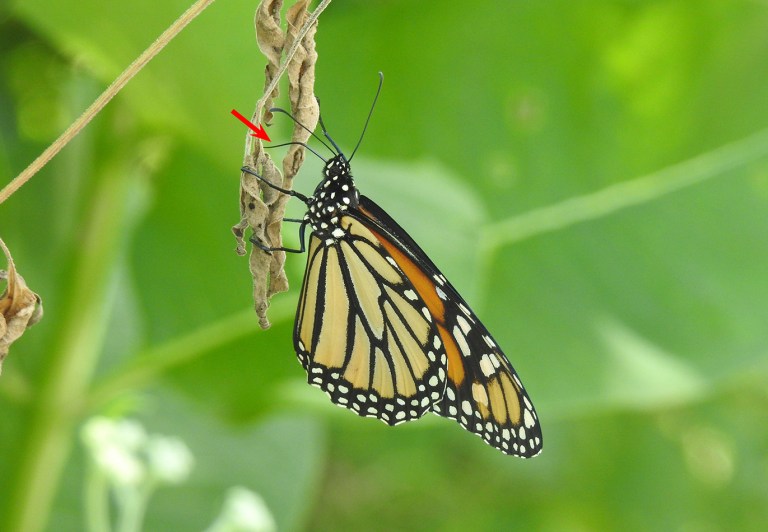
Got milkweed for monarch caterpillars? Check. Nectar plants that feed the adults all season long? Check. Dead and dried plants that contain pyrrolizidine alkaloids? … Say what?
Most of us are well aware of the connection between monarch butterflies and milkweed. But did you know that adult monarchs sometimes visit dry or injured parts of certain plants to take up and store toxic chemicals called pyrrolizidine alkaloids (PAs)? PAs do not provide the butterflies with food but contribute to their defense. Despite being poorly documented, this behavior must be of relevance in the life of monarchs, but it might be plastic—and most details are yet unknown. Until now, few people have observed or looked for this behavior in the U.S.
In the summer of 2019, a nature writer in Maryland, Nancy Lawson, began witnessing monarchs visiting dried and damaged leaves on boneset plants in her home habitat. Her outreach to Michael Boppré, a chemical ecologist in Germany who has studied relationships among pyrrolizidine alkaloids and insects, led to a paper in Ecological Entomology and a new citizen science project, Better understanding of this curious aspect of monarch biology could contribute to successful conservation, starting with field observations to learn which plants are used, under what conditions, by which sexes, for how long, and other aspects. Learn more about this fascinating and important behavior so you can help bridge the gaps in knowledge when you are out butterfly-ing this summer! The talk will focus on Danaus plexippus, but it will be put it in the general framework of PA-pharmacophagy and include discussion of other
milkweed butterflies (Danaini), clearwing butterflies (Ithomiini), arctiine moths (Arctiini), as well as other insects.
Bios:
Michael Boppré is a retired full professor at the Albert-Ludwigs-Universität, Freiburg, Germany. His research interests include biology, physiology, ecology and evolution of chemical communication in insects with focus on Danainae butterflies and Arctiinae moths, particularly in the context of male pheromones: androconial organs, chemistry and biosynthesis of pheromones, ethology, relation of intra- and interspecific communication (sexual communication and chemical defense; mimicry). He studies insect-plant relationships, particularly the roles of plant secondary metabolites (mainly pyrrolizidine
alkaloids) for insects; pharmacophagy under functional, ethological, ecophysiological,chemoecological, developmental and phylogenetic aspects.
Nancy Lawson is the author of The Humane Gardener: Nurturing a Backyard Habitat for Wildlife, habitat consultant, and frequent speaker on garden ecology. She founded Humane Gardener to pioneer creative planting strategies and other animal-friendly landscaping methods. Certified as a Chesapeake Bay Landscape Professional and masternaturalist, she partners with Howard County Bee City, Audubon Society of Central Maryland and other environmental organizations in the national capital region. Her book and garden have been featured in The New York Times, The Washington Post, and other
media outlets.
The Lep Club, is made up of novice and expert lepidopterists who meet to exchange knowledge and support concerning habitat, threats, food sources, identification, and life cycle of butterflies and moths. Club meetings encourage a sharing of knowledge for the raising and breeding of moths and butterflies through hands-on lessons and guest speakers. Club members are also involved in outreach in the greater Baltimore community through educational programs and service projects. Club meetings feature a guest speaker that share their knowledge on a topic related to moths and butterflies as well as time to distribute caterpillars and eggs. As a group, we rear and share incredible native butterflies and saturniid moths (lunas, polyphemus, cedropia, imperials and more) with one another. Senior club members always walk you through everything you need to know in order to successfully raise your new friends.
To learn more about all NHSM Clubs: https://youtu.be/pIA7naRjXws
To become a member: https://www.marylandnature.org/club-membership/